情态动词用法总结及相应练习
(完整)英语语法 情态动词及练习题

情态动词一、知识梳理/提炼1. can和could的用法表示能力或客观可能性,还可以表示请求和允许。
如:Can you finish this work tonight?Man cannot live without air.— Can I go now?— Yes, you can.注意:①could也可表示请求,语气委婉,主要用于疑问句,不可用于肯定句,答语应用can (即could不能用于现在时态的简略答语中)。
如:Could I come to see you tomorrow?Yes, you can。
(否定答语可用No, I'm afraid not。
)②can表示能力时,还可用be able to代替。
如:I'll not be able to come this afternoon。
2。
may和might的用法1)表示许可.表示请求、允许时,might比may的语气更委婉一些,否定回答时要用mustn't表示“不可以"、“禁止"、“阻止”之意.如:You may drive the car.— Might I use your pen? — No,you can’t/ mustn't. Yes, you can/may. 用May I .。
. 征询对方许可在文体上比较正式,在口气上比较客气。
在日常口语中,用CanI ... 征询对方意见在现代口语中更为常见.2) 用于祈使句中表示祝愿.如:祝你成功! May you succeed!3)表示推测、可能(疑问句不能用于此意)。
他现在可能很忙. He may be very busy now。
3。
must和have to的用法1) 表示必须、必要。
如:You must come in time.回答must引出的问句时,如果是否定的回答,不能用mustn't,而要用needn't或don't have to。
情态动词用法总结及相应练习

情态动词用法总结及相应练习在英语中,情态动词属于助动词。
除了作简略回答外,它们一般不能单独使用,它们必须与动词原形一起使用构成句子的谓语。
不同的情态动词会有不同的意义和用法。
有时,同一个情态动词在不同的语境中也会产生不同的含义。
下面我们将讨论这些情态动词的用法。
情态动词的推测性用法和非推测性用法情态动词一般有两种用法:推测性用法(epistemic use)和非推测性用法(non-epistemic use)。
推测性用法是指做出推测,预测事物发生的可能性;非推测性用法则指情态动词本身的基本含义,如XXX表示能力,may表示许可,must和should表示必须和义务,need 表示需要等。
例如:I can swim。
(非推测性用法)This can be true。
(推测性用法)You may go now。
(非推测性用法)He may be ill now。
(推测性用法)You must finish it before lunch time。
(非猜测性用法)He must be at home for he never goes out at dinner time。
(推测性用法)我们把英语中的9大神态动词按其猜测性和非猜测性用法列表如下:情态动词非推测性用法推测性用法can/could能力/许可(ability/n)可能(possibility)may/might许可(n)可能(possibility)will/would意愿(n)预言性(predictability)XXX责任和义务(n)应该是(logical necessity)must责任和任务(n)一定,一定(logical necessity)神态动词非猜测性用法的申明1.may和might透露表现允许may能够与分歧的人称搭配,透露表现“答应、允许”。
比方:May I know your name?You may be the first to leave if you are in a hurry。
英语情态动词用法总结(完整)
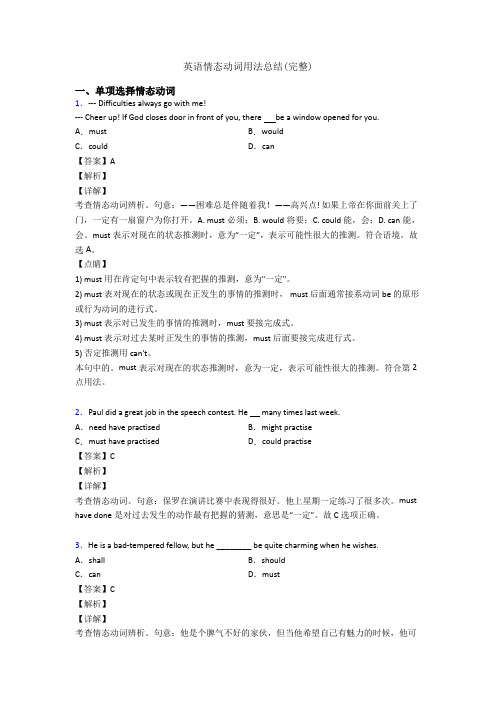
英语情态动词用法总结(完整)一、单项选择情态动词1.--- Difficulties always go with me!--- Cheer up! If God closes door in front of you, there be a window opened for you. A.must B.wouldC.could D.can【答案】A【解析】【详解】考查情态动词辨析。
句意:——困难总是伴随着我!——高兴点! 如果上帝在你面前关上了门,一定有一扇窗户为你打开。
A. must必须;B. would将要;C. could能,会;D. can能,会。
must表示对现在的状态推测时,意为“一定”,表示可能性很大的推测。
符合语境。
故选A。
【点睛】1) must用在肯定句中表示较有把握的推测,意为"一定"。
2) must表对现在的状态或现在正发生的事情的推测时, must 后面通常接系动词be 的原形或行为动词的进行式。
3) must 表示对已发生的事情的推测时,must 要接完成式。
4) must表示对过去某时正发生的事情的推测,must 后面要接完成进行式。
5) 否定推测用can't。
本句中的。
must表示对现在的状态推测时,意为一定,表示可能性很大的推测。
符合第2点用法。
2.Paul did a great job in the speech contest. He many times last week.A.need have practised B.might practiseC.must have practised D.could practise【答案】C【解析】【详解】考查情态动词。
句意:保罗在演讲比赛中表现得很好。
他上星期一定练习了很多次。
must have done是对过去发生的动作最有把握的猜测,意思是“一定”。
故C选项正确。
3.He is a bad-tempered fellow, but he ________ be quite charming when he wishes.A.shall B.shouldC.can D.must【答案】C【解析】【详解】考查情态动词辨析。
情态动词的用法及练习(附答案)
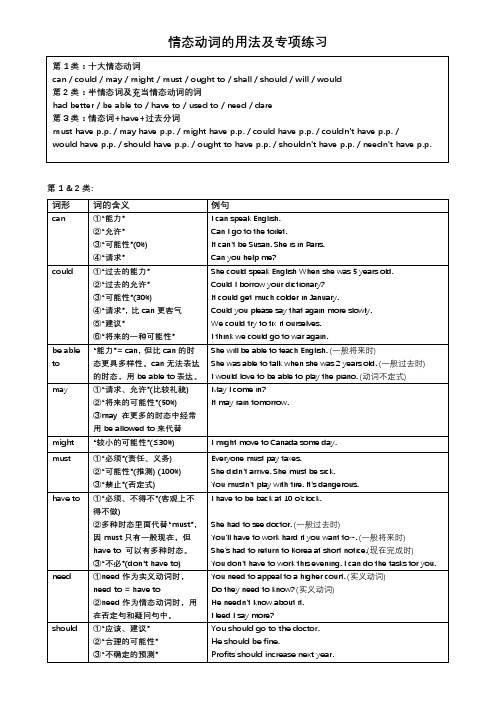
情态动词的用法及专项练习第1 & 2类:第3类1.could have p.p.①指过去某事有可能发生, 但并未.真的..发生。
They could have won the race, but they didn't try hard enough.He could have studied harder, but he was too lazy and that's why he failed the exam.②指过去有能力做某事, 但并未真的...做过。
I could have stayed up late, but I decided to go to bed early.Julie could have bought the book, but she borrowed it from the library instead.③对过去的发生事情做出一种猜测,但实际上并不知道真假。
仅仅是做一种观点上的表达。
He could have got stuck in traffic.He could have forgotten that we were meeting today.He could have overslept.2. may / might have p.p.(用法与could have p.p.第③点相同)对过去的发生事情做出一种猜测,但实际上并不知道真假。
仅仅是做一种观点上的表达。
He might have got stuck in traffic.He might have forgotten that we were meeting today.He might have overslept.3. couldn't have p.p.渴望、期望做某事, 但由于外部原因不可能做成, 即便是很想做。
是一种虚拟语气。
I couldn't have arrived any earlier. There was a terrible traffic jam (= it was impossible for me tohave arrived any earlier).He couldn't have passed the exam, even if he had studied harder. It's a really, really difficult exam.4. should / ought to have p.p.有一个好主意,该做而没有做。
情态动词的用法(附练习及参考答案)
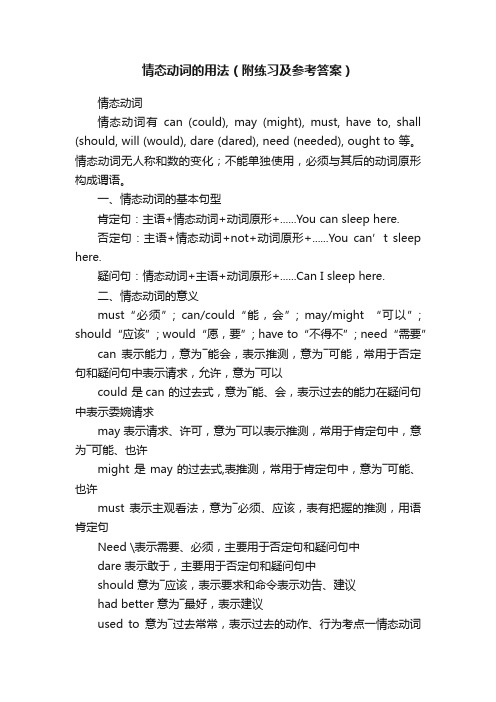
情态动词的用法(附练习及参考答案)情态动词情态动词有can (could), may (might), must, have to, shall (should, will (would), dare (dared), need (needed), ought to 等。
情态动词无人称和数的变化;不能单独使用,必须与其后的动词原形构成谓语。
一、情态动词的基本句型肯定句:主语+情态动词+动词原形+......You can sleep here.否定句:主语+情态动词+not+动词原形+......You can’t sleep here.疑问句:情态动词+主语+动词原形+......Can I sleep here.二、情态动词的意义must“必须”; can/could“能,会”; may/might “可以”; should“应该”; would“愿,要”; have to“不得不”; need“需要”can 表示能力,意为―能会,表示推测,意为―可能,常用于否定句和疑问句中表示请求,允许,意为―可以could 是can 的过去式,意为―能、会,表示过去的能力在疑问句中表示委婉请求may 表示请求、许可,意为―可以表示推测,常用于肯定句中,意为―可能、也许might 是may的过去式,表推测,常用于肯定句中,意为―可能、也许must 表示主观看法,意为―必须、应该,表有把握的推测,用语肯定句Need \表示需要、必须,主要用于否定句和疑问句中dare 表示敢于,主要用于否定句和疑问句中should 意为―应该,表示要求和命令表示劝告、建议had better 意为―最好,表示建议used to意为―过去常常,表示过去的动作、行为考点一情态动词情态动词有具体的词义,但也同助动词一样,需要与其他词语一起构成句子的谓语,另外情态动词没哟人称和数的变化,情态动词后必须跟动词原形。
三、情态动词的基本用法1. can 的用法(1)表示能力、许可、可能性。
情态动词的用法及练习(附答案)

情态动词的用法及专项练习第1 & 2类:词形词的含义例句can ①“能力”②“允许”③“可能性”(0%)④“请求”I can speak English.Can I go to the toilet.It can’t be Susan. She is in Paris. Can you help me?could ①“过去的能力”②“过去的允许”③“可能性”(30%)④“请求”, 比can更客气⑤“建议”⑥“将来的一种可能性”She could speak English When she was 5 years old. Could I borrow your dictionary?It could get much colder in January.Could you please say that again more slowly.We could try to fix it ourselves.I think we could go to war again.be able to “能力”= can, 但比can的时态更具多样性。
can无法表达的时态,用be able to表达。
She will be able to teach English. (一般将来时)She was able to talk when she was 2 years old. (一般过去时)I would love to be able to play the piano. (动词不定式)may ①“请求、允许”(比较礼貌)②“将来的可能性”(50%)③may 在更多的时态中经常May I come in?It may rain tomorrow.第1类:十大情态动词can / could / may / might / must / ought to / shall / should / will / would 第2类:半情态词及充当情态动词的词had better / be able to / have to / used to / need / dare用be allowed to来代替might “较小的可能性”(≤30%)I might move to Canada some day.must ①“必须”(责任、义务)②“可能性”(推测) (100%)③“禁止”(否定式) Everyone must pay taxes.She didn’t arrive. She must be sick.You mustn’t p l ay with fire. It’s dangerous.have to ①“必须、不得不”(客观上不得不做)②多种时态里面代替“must”,因must只有一般现在,但have to 可以有多种时态。
情态动词详解、典型例题及模拟试题(含答案)教学文案
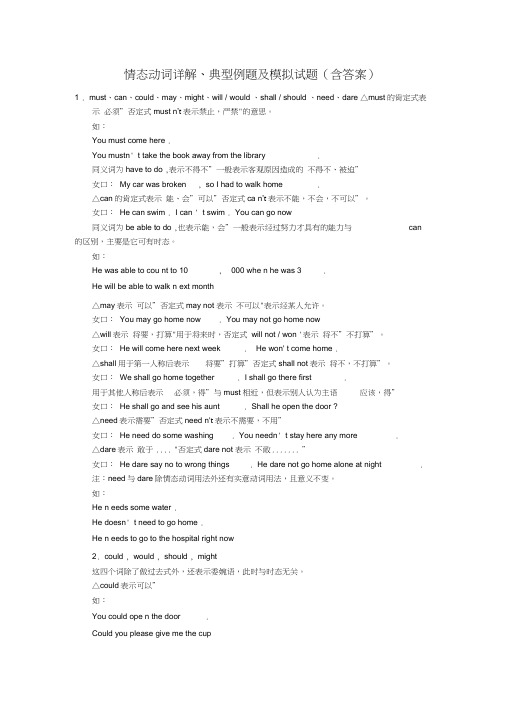
情态动词详解、典型例题及模拟试题(含答案)1 . must、can、could、may、might、will / would 、shall / should 、need、dare △must的肯定式表示必须”否定式must n't表示禁止,严禁"的意思。
如:You must come here .You mustn' t take the book away from the library .同义词为have to do ,表示不得不”一般表示客观原因造成的不得不、被迫”女口:My car was broken , so I had to walk home .△can的肯定式表示能、会”可以”否定式ca n't表示不能,不会,不可以”。
女口:He can swim . I can ' t swim . You can go now同义词为be able to do ,也表示能,会”一般表示经过努力才具有的能力与can 的区别,主要是它可有时态。
如:He was able to cou nt to 10 , 000 whe n he was 3 .He will be able to walk n ext month△may表示可以”否定式may not 表示不可以"表示经某人允许。
女口:You may go home now . You may not go home now△will表示将要,打算"用于将来时,否定式will not / won '表示将不”不打算”。
女口:He will come here next week . He won' t come home .△shall用于第一人称后表示将要”打算”否定式shall not表示将不,不打算”。
女口:We shall go home together . I shall go there first .用于其他人称后表示必须,得”与must相近,但表示别人认为主语应该,得”女口:He shall go and see his aunt . Shall he open the door ?△need表示需要”否定式need n't表示不需要,不用”女口:He need do some washing . You needn' t stay here any more .△dare表示敢于.... "否定式dare not 表示不敢....... ”女口:He dare say no to wrong things . He dare not go home alone at night .注:need与dare除情态动词用法外还有实意动词用法,且意义不变。
(完整版)情态动词用法及其练习与答案
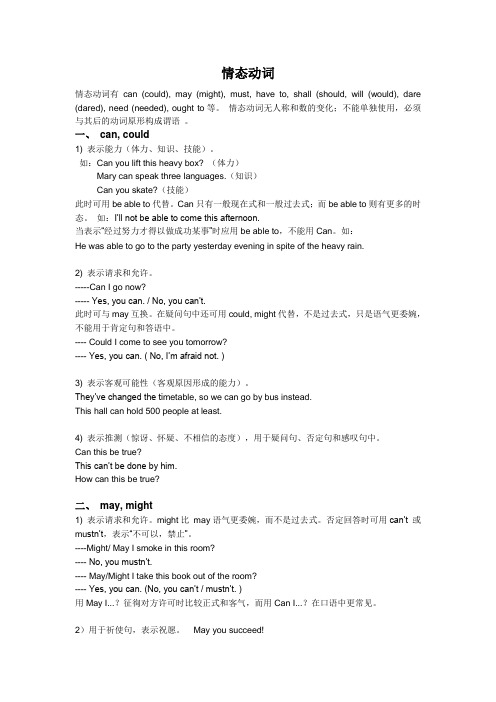
情态动词情态动词有can (could), may (might), must, have to, shall (should, will (would), dare (dared), need (needed), ought to等。
情态动词无人称和数的变化;不能单独使用,必须与其后的动词原形构成谓语。
一、can, could1) 表示能力(体力、知识、技能)。
如:Can you lift this heavy box? (体力)Mary can speak three languages.(知识)Can you skate?(技能)此时可用be able to代替。
Can只有一般现在式和一般过去式;而be able to则有更多的时态。
如:I’ll not be able to come this afternoon.当表示“经过努力才得以做成功某事”时应用be able to,不能用Can。
如:He was able to go to the party yesterday evening in spite of the heavy rain.2) 表示请求和允许。
-----Can I go now?----- Yes, you can. / No, you can’t.此时可与may互换。
在疑问句中还可用could, might代替,不是过去式,只是语气更委婉,不能用于肯定句和答语中。
---- Could I come to see you tomorrow?---- Yes, you can. ( No, I’m afraid not. )3) 表示客观可能性(客观原因形成的能力)。
They’ve changed the ti metable, so we can go by bus instead.This hall can hold 500 people at least.4) 表示推测(惊讶、怀疑、不相信的态度),用于疑问句、否定句和感叹句中。
- 1、下载文档前请自行甄别文档内容的完整性,平台不提供额外的编辑、内容补充、找答案等附加服务。
- 2、"仅部分预览"的文档,不可在线预览部分如存在完整性等问题,可反馈申请退款(可完整预览的文档不适用该条件!)。
- 3、如文档侵犯您的权益,请联系客服反馈,我们会尽快为您处理(人工客服工作时间:9:00-18:30)。
Modal Verbs在英语中,情态动词属于助动词。
除了作简略回答外,它们一般不能单独使用,它们必须与动词原形一起使用构成句子的谓语。
不同的情态动词会有不同的意义和用法。
有时,同一个情态动词在不同的语境中也会产生不同的含义。
下面我们将讨论这些情态动词的用法。
情态动词的推测性用法和非推测性用法情态动词一般有两种用法:推测性用法(epistemic use) 和非推测性用法(non-epistemic use) 。
推测性用法是指做出推测,预测事物发生的可能性; 非推测性用法则指情态动词本身的基本含义,如can表示能力,may 表示许可,must和should表示必须和义务,need表示需要等。
例如:I can swim. (非推测性用法)This can be true. (推测性用法)You may go now. (非推测性用法)He may be ill now. (推测性用法)You must finish it before lunch time. (非推测性用法)He must be at home for he never goes out at dinner time. (推测性用法)我们把英语中的9大情态动词按其推测性和非推测性用法列表如下:情态动词非推测性用法的说明1. may和might表示允许may可以与不同的人称搭配,表示“许可、允许”。
例如:May I know your name?You may be the first to leave if you are in a hurry. (我允许你第一个离开。
)You may keep the book for two months. (我允许你借。
)In certain circumstances a police officer may ask a driver to take a breath test.may用在疑问句中,经常表示“允许、许可”的意思。
例如:May I know your name?May I come in?might可以用来表示过去时态,也可以表示委婉语气。
例如:She said that he might take her dictionary. (may的过去式)Might I have a word with you? (委婉用法)I wonder if I might have more salad. (委婉用法)但在回答中,我们一般用may加强肯定的语气,而不用might.例如:Yes, of course you may.may not可用来表示“禁止”或“不许”,因语气较强,所以不用might not.例如:Students may not stay out of the dormitory after midnight without written permission.must not也可以表示“禁止”,而且语气比may not更强,强调上级对下级的不允许。
另外,may/might as well也是一个常用的词组,后接动词原形,意思是“不妨,最好”相当于had better.例如:It's very late. We might as well go home.2. can和could1) 表示能力can,could和be able to都可以表示能力。
但若要表示在过去某个具体场合下能够做某事的能力,我们用was/were able to.例如:— Thank you for your help.—I‘m glad I was able to help you. (在这种情况下能够帮你,而且已经帮了。
)所以was/were able to不仅表示过去的某个具体场合下的能力,还强调动作已经成功完成,相当于manage to do或succeed in doing.例如:We were able to save him. (把他救活了。
)He was able to explain what had happened. (他能解释,而且也解释了。
)He could explain what had happened. (他能做出解释,但可能没有说。
)但这种区别只局限在陈述句,在否定句中,be able to和could可以互换。
有时,could表示的并不是can的过去式,而是一种委婉的语气。
例如:Could you run the business yourself?I could give you a chance.Could you please give me your reply as soon as possible?could have done有虚拟的含义,即“本来能够做,但事实上却没有做”。
例如:You could have told me earlier.I could have helped her.I could have passed the exam if I had worked harder.2) 表示许可can也可以用来表示“允许”,例如:Can I smoke here?You can use my dictionary now.The policeman says we can't park our car here.could可以使句子更显礼貌,但在肯定回答中,我们一般用can代替could,加强肯定的语气。
即:Yes, of course you can.3) 其他用法can not与help, bear, stand等动词连用,表示“禁不住,受不了”。
例如:If one had talent, one can't help showing it.I can't stand waiting any longer.但是can’t help but 后面接动词原形,表示“只能”。
I can not help but ask you: “do you have loved me?”I can’t help but wait.3. must表示必须must的这种用法,体现了说话者的权威性,所以must通常用于上级对下级、长辈对小辈。
例如:You must be back by ten o'clock.Teacher: You must use a dictionary. I’m tired of your spelling mistakes.[注意]must和have to的区别:must表示出于说话者本人的主观愿望,必须去做某事;而have to表示受外部条件的影响,不得不做某事。
例如:I must leave now. (我自己想离开,主观愿望。
)I have to leave now. (也许我还想坐一会儿,但我有要事,不得不走了。
)He must say it in English. (除了英语,他可能还懂其他语言,但我的主观愿望是他必须说英语。
)He has to say it in English. (客观条件是他只懂英语,所以不得不用英语说。
)另外,由于must没有将来时态,所以我们通常用will/shall have to来表示;由于must没有过去时态,所以我们通常用had to来表示。
例如:We will have to do it again.I had to leave at 6:30 yesterday.但有时,我们也可以在表示过去的上下文中使用must.例如:I told him that he must mind his own business.must有两种否定形式:mustn't和needn't/don't have to.mustn't表示"不可以“,needn't/don't have to表示“不必”,例如:You mustn't talk like that. (不可以= You are not allowed to talk like that.)— Must you leave so soon?— No, I needn't.4. should和ought tos hould和ought to通常可以交互使用,意义没有多大的区别,表示“应该”。
should和ought to的这种用法通常表示“建议、敦促或怂恿”。
[比较]must, have to和should/ought to所表示的不同语气:钢琴老师对某学生说:You must practice at least an hour a day. (must 显示了老师的权威。
)这个学生然后对他的朋友说:I have to practice an hour a day! (have to表示我本身不想练,但迫于老师的压力,不得不练。
)他的朋友会说:You ought to/should practice for more than an hour. (表示不是来自外界的权威或压力,而是来自平辈同学或朋友的建议:如要做个好学生,弹好钢琴。
)另外,should have done/ought to have done表示“本该发生的事没有发生;例如:You should have told me earlier.You ought to have been more careful.5. will和wouldwill和would作情态动词使用,主要有以下的用法:1) 表示意愿will和would表示的意愿可强可弱,意愿弱时表示“愿意做某事”(willingness) ;意愿强时表示“坚持要做某事”(insistence) .例如:Will you go with us?(愿意)Will you pass me the salt? (愿意)Let us have a talk, will you? (愿意)I will marry her although my parents are strongly against our marriage.(表示坚持)would可以表示“过去的愿意”,一般用于间接引语中,例如:He said he would come.在其他情况下,would不表示过去,而表示"委婉的语气“,例如:Would you please make a copy for me?但在回答中,为了加强肯定的语气,我们用will.例如:— Would you let me hear from you soon?— Yes, I will.2) 表示能力、趋势或必然性will和would的这种用法一般以东西作为主语,表示“其内在的性能或特征性倾向”。
